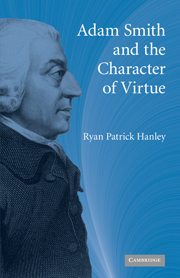Book contents
- Frontmatter
- Contents
- Preface
- Acknowledgments
- Abbreviations
- Introduction
- 1 The Problem: Commerce and Corruption
- 2 The Solution: Moral Philosophy
- 3 Interlude: The What and the How of TMS VI
- 4 Prudence, or Commercial Virtue
- 5 Magnanimity, or Classical Virtue
- 6 Beneficence, or Christian Virtue
- Epilogue: The “Economy of Greatness”
- Index
- References
Introduction
Published online by Cambridge University Press: 06 November 2009
- Frontmatter
- Contents
- Preface
- Acknowledgments
- Abbreviations
- Introduction
- 1 The Problem: Commerce and Corruption
- 2 The Solution: Moral Philosophy
- 3 Interlude: The What and the How of TMS VI
- 4 Prudence, or Commercial Virtue
- 5 Magnanimity, or Classical Virtue
- 6 Beneficence, or Christian Virtue
- Epilogue: The “Economy of Greatness”
- Index
- References
Summary
We live in strange times. Depending on where one looks, the student of capitalist society can discover good reasons for either hope or despair. Even before the most recent global financial crisis, partisans of the latter view were particularly vocal. The titles of two recent books in economics tell much of the contemporary story: warning us of “the moral consequences of economic growth,” they caution us that we stand in the midst of a “battle for the soul of capitalism.” Part of this concern emerges from an ever-growing awareness that our capitalist culture has recently entered a new stage. This “new capitalism,” as it has come to be called, has been criticized on a number of fronts, including its effects on labor, on the corporation, and on political identity. But its most powerful critics have focused on the effects of consumerism and materialism on human well-being. It is a concern that has united a strange set of allies, from postmodernists to paleo-conservatives, from Pope Benedict to Baudrillard, from Lyotard to Leo Strauss. Indeed across the political and the philosophical spectra, an unexpected consensus has emerged over the fact that the moral psychologies and political orders to which consumerism and materialism have given rise have eviscerated the human psyche. And this is hardly a concern limited to “humanists”; social scientists – from psychologists to sociologists to political scientists – have all attested to these dangers as well. But what should we make of this strange consensus?
- Type
- Chapter
- Information
- Adam Smith and the Character of Virtue , pp. 1 - 14Publisher: Cambridge University PressPrint publication year: 2009



